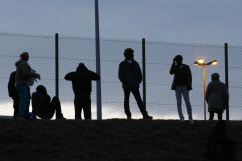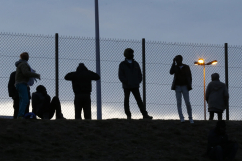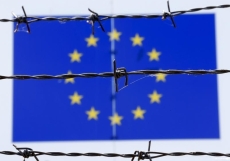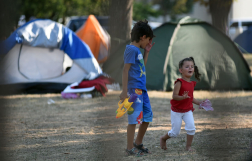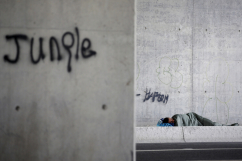Chancellor Angela Merkel condemned on Monday violent protests against refugees that erupted over the weekend in eastern Germany, blaming them on far-right extremists who were bent on spreading a "disgusting" message of hatred.
More than 30 police were injured in clashes in the town of Heidenau near Dresden in early Saturday morning, after a mob of several hundred people, many of them drunk, began pelting officers with bottles and fireworks. Some of them shouted "Heil Hitler".
Germany, which expects the number of asylum seekers to quadruple to about 800,000 this year, has witnessed dozens of arson attacks on asylum shelters in recent months. But the violence in Heidenau, which continued on Saturday and Sunday nights, was unprecedented.
Sigmar Gabriel, vice chancellor and economy minister, traveled to the town of 16,000 on Monday, meeting with the mayor and speaking with local residents.
"There are a lot of people that worry their lives will change because of the refugees, that living here will become less secure," Gabriel said.
"But it must be clear that we don't give a single millimeter to these far-right mobs," he added. "These are people that have nothing to do with Germany. This is not the Germany we want."
Merkel, through her spokesman Steffen Seibert, said it was disgusting how right-wing extremists and neo-Nazis had tried to spread their message of hate near a shelter in Heidenau, where some 250 refugees arrived late on Friday.
"The chancellor and the whole government condemn in the strongest manner possible the violence and the aggressive atmosphere toward foreigners there," Seibert said.
On its website, Heidenau describes itself as "the friendly town on the river Elbe". A public relations video on Youtube shows an idyllic, family-oriented town, with children singing in a field of flowers and splashing each other with water from a fountain.
But Heidenau is located in an electoral district where the far-right National Democratic Party (NPD) won 8.7 percent of the vote in a state election last year. It was the third-highest NPD score in all of Saxony, an eastern state of 4 million that shares a border with Poland and the Czech Republic.
Mayor Juergen Opitz, a member of Merkel's conservative Christian Democratic Union (CDU), described the protesters as an "unholy alliance" of far-right elements from Heidenau and "Nazi tourists" who traveled from other parts of Saxony to cause trouble wherever asylum centers were set up.
Many of the refugees arriving in Germany are fleeing violence in countries like Syria, Iraq and Eritrea, but over a third are from southeastern European countries like Albania and Serbia.










